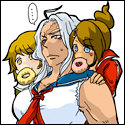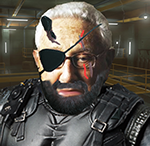|
The Lone Badger posted:And of course Warhammer has Morr. His sole job is to make sure dead people stay dead, and the residents of the empire are very happy that there's someone doing that job. Also protect the souls of the dead from Chaos, which is sort of a big deal for them. And terrify children. Children need to be terrified by visions of their inevitable death, important part of turning 10. But then, with Death magic and Morrites and all Hams had a lot of 'accepting that death is a part of life is an important part of being healthy, especially as the alternatives mostly involve killing lots of people'. His brother Khaine was a jerk though (elves get real mad if you tell them that version, and Druchii get especially mad if you point out that they worship Khaine very, very similarly to the outlawed Classical Human traditions)
|
|
|
|

|
| # ? Apr 25, 2024 07:01 |
|
Night10194 posted:Also protect the souls of the dead from Chaos, which is sort of a big deal for them. And terrify children. Children need to be terrified by visions of their inevitable death, important part of turning 10.
|
|
|
|
Gatto Grigio posted:The ultimate problem with the FR gods is that their existence is proven and they actively engage with mortal affairs to a degree even beyond classic meddler pantheons like the Greek gods. The Greek gods didn’t have legions of followers who they personally spoke to and invested with their power. The Greeks gods didn’t have vast tracts of land in the mortal realm that they personally manage, like Zhentil Keep for Bane/Cyric or the giant plantation run by Chauntea that literally supplies produce to most of the major cities in the North.
|
|
|
|
Halloween Jack posted:What I don't understand about the FR gods is why the setting isn't cataclysmic godwar all of the time. Like, I read part of the 3e Faiths & Pantheons book, and it's full of statblocks for the gods. Including stuff like, because Kelemvor is the god of death, he's aware of every death X days before it happens, can sense all deaths within X miles, and other genuinely godlike abilities. And I was baffled because they have these statblocks for the gods, but no apparent rules or even guidelines to deal with e.g. how to fight a guy who already knows if he's gonna kill you or not, plus what stops the gods from just using these powers to their fullest extent on the mortal plane, all of the time. "Ao will get mad?" Pretty much. I'm assuming that the statblocks were more for avatars/manifestions on the mortal plane. You go onto a god's actual home turf and they're, well, God. No "to hits" or "saving throws." You go to Mystra/Midnight's home with ill intent and she decides you turn into a radish, then you just turn into a radish. Meanwhile, Ao's a god to them on that level everywhere even on their own home turf. They try a full-on godwar and he'll turn them into radishes and promote some worshipers.
|
|
|
|
It is very difficult to stand up against a being who can snap their fingers and you instantly lose all your godly power and has proven that if they are pissed off enough that they will do it.
|
|
|
|
Okay, but that's incredibly stupid and terrible writing. How hot can the war get before Ao steps in? They're constantly meddling; how much is too much? And doesn't that just invalidate everything that happens in the setting? It's like, I once heard a grognard remark "If you want to know why St. Cuthbert only gives you so many spells per day, why don't you ask him?"  And like...this is D&D. I can absolutely go to his home plane and ask him, and there's no answer. And like...this is D&D. I can absolutely go to his home plane and ask him, and there's no answer.
|
|
|
|
Halloween Jack posted:Okay, but that's incredibly stupid and terrible writing. How hot can the war get before Ao steps in? They're constantly meddling; how much is too much? And doesn't that just invalidate everything that happens in the setting? “Deciding to get rid of the Wall” is an example of A Step Too Far, apparently.
|
|
|
|
Halloween Jack posted:Okay, but that's incredibly stupid and terrible writing. How hot can the war get before Ao steps in? They're constantly meddling; how much is too much? And doesn't that just invalidate everything that happens in the setting? 1. No one ever said it was good writing. 2. This just runs into the general issues of any setting where there are proven gods who do interfere with daily affairs. 3. To be fair to the grognard that question is the equivalent of asking why can't people breath through their elbows.
|
|
|
|
Halloween Jack posted:Okay, but that's incredibly stupid and terrible writing. How hot can the war get before Ao steps in? They're constantly meddling; how much is too much? And doesn't that just invalidate everything that happens in the setting? This is DnD, there is literally a spell for this and every cleric of the appropriate level can reach it. But then DnD writers would have to write as though people in their setting knew magic existed and is widely available which makes DnD stop working, except for the settings where magic is literally technology or stuff like Dark Sun.
|
|
|
|
I have fondness for the goofier stuff in the Realms due to it being one of my first settings in 2e. But Greenwood’s biggest flaw, especially as a fantasy writer, is that he’s ultimately incurious. The FR is based off of a setting he’s allegedly been writing since he was 10 years old, and he’s never been willing to explore the implications of the setting beyond its surface level. This is tied in to another problem; he can’t conceive of anyone else wanting to have agency in his created world. He reminds of an archetype of terrible GM called The Frustrated Novelist. Ed built this world from the ground-up and made super-powerful versions of himself and the kind of people he likes to spend time with, and he can’t conceive of the idea that players should want to do anything other than spend time with his NPCs and follow their whim. It’s the twisted sense of ownership that believes you are paying for the privilege to explore his Magical Realm.
|
|
|
|
potatocubed posted:In this post you describe five locations where both men and women are present. In all five, if the location is infected with spideryness it's a woman who is showing the effects. With the focus on weird pregnancies and miss mouth STD, though everybody seems to be awful, it definitely seems to have that cis-male sexfear common to the edgier end of the OSR.
|
|
|
|
90s Cringe Rock posted:Not even given the dignity of an explanation, just gone in the errata. That's great. and exactly what the Wall of the Faithless deserves. Trivia: The only reason that tearing down the wall was not an option in NWN2: Mask of the Betrayer was because Obsidian was certain that D&D wouldn't let them.
|
|
|
|
In the Godbound Time of Troubles game I ran, I ruled that since gods themselves didn’t worship anybody and you can’t worship yourself, any god that died in the mortal realm during the Troubles went directly to the Wall of the Faithless. Do no pass “Go.” Do not collect 200 gp. It became a good impetus for the PCs to set things right so they could finally get rid of the drat thing. Gatto Grigio fucked around with this message at 17:56 on Sep 9, 2021 |
|
|
|
Forgotten Realms is basically a Dominions game before the Pantokrator gets bored, except nowhere near as interesting and with no ability to just, you know, be the pretender gods the story is actually about.
|
|
|
|
Epicurius posted:Or even "You're the assistants to the heroes, but the heroes are actually incompetent, and you have to manipulate stuff to accomplish the tasks and make them look good." There's a David Drake story where this exact thing happens, but with the added bonus of all the hirelings realizing that they're all going to die, so they might as well make sure they die a good death. Like an old man making sure he's that he's completely flattened, or being sure to have their last words be dramatic.
|
|
|
|
There are no god wars in FR largely because if they started one Ao would interfere which he will even if he does not want to do. The 5e Realms outright decided to have the Gods take more of a back seat. With Ao tried of the poo poo the gods were doing, so he made the gods to go to their divine realms, and removed their ability to manifest themselves or their avatars on Toril under their own power. Leaving them to only interact with the world through their portfolios and followers, so they can no longer directly meddle (Unless their followers do a huge complicated ritual to summon them). Some gods like the Dead Three rejected this and chose to stay on Toril anyway, but had to give up most of their godly power to be allowed to do so. (Though going by Auril who also did this, a god is allowed to head to their divine realm at any point, they will just become barred from re-entering Toril once they do.) I honestly quite like Greyhawk's system for how the gods don't meddle. To manifest themselves they need the permission of all the other gods. St Cuthbert is one of the only ones who has a bit more freedom in his manifesting, because he was given permission to do so by all the gods, if he feels that the demigod Iuz has overstepped his bounds as a divine being. Mors Rattus posted:“Deciding to get rid of the Wall” is an example of A Step Too Far, apparently. That was not Ao it was other gods. Ao has only manifested a few times. To punish the gods and end the time of troubles, and when he fixed the Spellplague and barred the Gods from doing further poo poo. MonsterEnvy fucked around with this message at 20:45 on Sep 9, 2021 |
|
|
|
Have you ever once considered these things don't exist and that writers create all of these constructs, because they're fiction? In-universe explanations for things do not generally explain them, so to speak. When people are like 'why isn't Forgotten Realms just about the Gods, since most of the stories are', they are asking why it is constructed the way it is by the authors, something better explained by the post about Ed Greenwood and his weird sense of ownership of the setting than any 'well the high kinggod of the landwizards said-'. The discussion is about the construction of the setting and why it reads the way it does, and how it could potentially read better or make for a better story if something was changed, not about the in-universe explanations as they currently exist. E: To put it further, and more clearly, this is why I say Forgotten Realms is accidentally maltheist. It is clear the writers do not intend for the Gods to be read as a bunch of tyrannical landlords, but accidentally create a situation where that reading is not only valid, but quite obvious. The Forgotten Realms is not interested in talking about the relationship of its Gods to the many pastiche states of the setting; as noted above, Greenwood is fundamentally incurious as an author and most of the Realms material doesn't care about this stuff, it just ends up coming up because the stories focus on the dozens of Gods and their stat-blocks so often that it pushes them front and center regardless of writer intent. And then makes them astonishingly unflattering. This isn't the authors' intent, I'm quite certain of it, so 'accidentally maltheist' is the way to put it. This thus represents a failure of the writing and its communication, and so the choice is to either embrace the reading that it generates or discuss how to rewrite things to return to the original intent and focus of the story. And yes! The Time of Troubles represents, in effect, a situation tailor made to let players actually interact with one of the main portions of the Forgotten Realms on terms that matter to player characters...and then it's used like it is in the above adventure path. Night10194 fucked around with this message at 20:58 on Sep 9, 2021 |
|
|
|
the Time of Troubles is honestly a really appealing idea to me for a campaign setting. this is more because it would allow the party to say, directly interact with and/or murder the gods and take their place. apparently this is not allowed by any official module.
|
|
|
|
Pretty much, the Wall of the Faithless sticks in a lot of people's craw because it was solving a problem that didn't really exist, scans as fundamentally vile with a lot of ethical repercussions that the writers clearly hadn't thought out. The fact it was excised in errata pretty much was a signal how vastly unpopular the concept was that it didn't even get an event or adventure about it's disappearance.
|
|
|
|
Meanwhile I prefer the route of 'embrace this, the Gods are vile landlords' because it at least gives them something besides being an overstuffed generic fantasy pantheon. I got several good stories out of that, so it certainly worked out.
|
|
|
|
and we all got BG2 too
|
|
|
|
Baldur's Gate was great fun.
|
|
|
|
Robindaybird posted:Pretty much, the Wall of the Faithless sticks in a lot of people's craw because it was solving a problem that didn't really exist, scans as fundamentally vile with a lot of ethical repercussions that the writers clearly hadn't thought out. I would assume they just put the retcon in that Kelemvor did not put it back up.
|
|
|
|
It would be a fun setting change if Kelemvor refused to back down and as a result was the only good aligned god left. You get a gods' war but the sides are the dead and humanity vs the entire slew of all possible outsiders.
|
|
|
|
I would absolutely play Time of Troubles 2: Kelemvor's The Only Comrade
|
|
|
|
Remember, the big plot of NWN2's Expansion was that trying to destroy the Wall was bad.
|
|
|
|
Fivemarks posted:Remember, the big plot of NWN2's Expansion was that trying to destroy the Wall was bad. mostly because the writers thought they'd get Vetoed if they try to write an ending where you can, Mask of the Betrayer never made a strong argument for the Wall being a good being, at best it was a 'needed' thing.
|
|
|
|
Everyone posted:As noted this series and some other big module for Greyhawk were specifically to shift from 1st ed to 2nd ed and eliminate Assassins and Monks as classes. I was deeply amused, even as a child, that Salvatore was all 'gently caress that' and just made one of his book characters a 1e monk with all the super powers. While also giving his cleric a grenade launcher. It was a deeply dumb, but fun, series of books.
|
|
|
|
EimiYoshikawa posted:I was deeply amused, even as a child, that Salvatore was all 'gently caress that' and just made one of his book characters a 1e monk with all the super powers. Which books were these?
|
|
|
|
 3:16 Carnage Among The Stars - Part 1 Published in 2009 and authored by Gregory Hutton, who as far as I am aware has not written anything else of particular note (though I do actually also own a copy of his other game Remember Tomorrow). This is a military SciFi game and is not subtle about it. Theme wise it might be considered a mashup of Starship Troopers, Aliens and Warhammer 40k. It is, in my opinion, a flawed gem of a game and well worth looking at. In many ways, I would say that it was at least as influential in developing how I looked at and played RPG's as Apocalypse World (which I purchased and read at the same time incidentally). It does a bunch of things right; has a tight relationship between theme, mechanics and gameplay; a clever emergent meta element to play; and some generally solid and interesting minimalist design choices that were different from anything I had read prior. It also has some real flaws. I ran a single full campaign of this for my play group. I enjoyed it and don't regret having played it, but I also have no real desire to play it again. With that out of the way, let's get into the text. The first thing I want to say is that I really dig the art style used. I remember seeing some complaints online about the art, but I disagree. It's very simple and stylized but I think it works very well and gives a real sense of the vibe the author is going for. Seriously, check these dope looking space war criminals.  There are a ton of these through the book, generally every second page or so. The second thing I want to say is that the size and shape of this book is super annoying. It doesn't really fit cleanly with any of my other RPG books. If I put it on the shelf with the others I'd need to worry about the larger books bending around it. According to the notes at the end of the book, the size and shape was dictated by the cover art. I'm assuming it must have been provided by the artist for free as a favour of something, because adapting your whole layout to a single piece of art is such a strange decision otherwise. The book is about 100 (small) pages roughly, so it's a pretty short and light game rules wise. Chapter 1 - What Is This Book The book starts with the usual description of an RPG. The chapter also contains the initial setting pitch: Terra is a utopia. There is no disease, no crime, no poverty, no discrimination, no violence, no death. You live as long as you want. The potential issue of overpopulation is resolved by the simple expedient of sterilizing everyone. If you want to have children you need to apply to the ruling council. You do not need to work, as society has essentially reached full automated space luxury communism. Everything is fine. You may make a future note that the game starts laying it's meta plot framework here. It's not exactly mind blowing or anything, particularly if you're already familiar with SciFi tropes, but I think it is well executed. Anyhow, life on Earth is basically a perfect paradise. The only problem is that humans are worried some external forces might eventually come gently caress that paradise up. When you live forever you start getting concerned with very long potential time scales. So humanity devised a solution, a very human solution. All that was necessary to ensure the safety of humanity forever was to genocide all non human life from the rest of the galaxy. All of it. Yay humanity! Ever since this policy was implemented, regiments have been recruited pretty much on a constant basis. Life on Terra is safe but it can also be dull, so they generally don't have too many issues finding willing recruits. The regiments promise adventure, action and new experiences. They also offer a form of civic duty: if you are tired of life, don't jump in a suicide booth; join the army instead! While the force is primarily volunteer based, sometimes people who have committed certain crimes can also get sentenced to join the regiments. Huh, that's odd. Probably not important, don't worry about it. Players are all low ranking members of the titular elite 3:16, the 16th Brigade of the 3rd Army. Together they will travel the vast unexplored expanses of the galaxy, discovering wonderous new places and species. Then they will teach those species about this human thing called "war" and callously murder them in their thousands. Don't worry about asking awkward and difficult questions about morality, psychological trauma or genocide, we are definitely playing the good guys here in a fun and pulpy SciFi action game! Someday, your characters may even make it back home to Terra. Wouldn't that be fun? Chapter 2 - Getting Started This chapter essentially just runs you through your average physical prep for running a game. It does include a quick bit on theme: War and the choices you make. It also has a glossary of most of the important keywords. I'll be talking about them as they actually come up in the rules, but I like this as a brief page that lets you know what to look for when you first read the book. It's nice to go into the actual rules knowing that Flashbacks are going to be a thing for instance, even though they won't come up for a bit. Chapter 3 - Character Generation  Now we get to character creation and some actual rules! First you choose a name for your character. You are encouraged to simply choose a catchy one word nickname. You are explicitly discouraged from putting a ton of thought into your backstory, since you will be developing it through the play mechanics. Once you have a name, you choose a short phrase, or single word, to describe your character concept. Then you stat your character out. You are given 10 points to spread between your two stats however you like, with a minimum requirement of two points. That's right, take a seat Powered by the Apocalypse, there are only two character stats in this game. Higher stat numbers are better. They are: FA : FA is your Fighting Ability. It is the stat you roll against for anything related to fighting. Anything. Shooting aliens is FA. A barracks room boxing match is FA. Fastballing a grenade directly down the main gun of a hovertank is FA. Knifing your dipshit LT in the back when he leaves his foxhole one night to go take a piss is also FA. Not sure why you'd ever want to do that though, you're out here to squish bugs. NFA: NFA is your Non Fighting Ability. It will come as no surprise that it is used for any and all actions that are not covered by FA. Want to convince your squadmates they don't want to live forever? Want to pilot an APC? Want to fast talk your captain into believing that you weren't running away, you were tactically repositioning? Want to grill some tasty alien steaks? These things are all NFA rolls. (Conversely, flame broiling some aliens with a Flame-Gun would be FA. Probably up to the GM what to use if you want the corpses to be tasty afterwards.) Having determined both of these stats, you then roll a d10 for each point of FA you took. Add the results together and you get the total number of career kills your character has achieved so far. The book suggests the average will work out to around 25-30. Don't worry, this number will rapidly grow through play. Once your players have picked their stats, you make a couple of simple rank determinations. The character with the highest NFA score is deemed to be the squad Sergeant. The character with the highest FA score is the Corporal. All other characters are lowly Troopers. You may decide to have a floating number of NPC squad mates as the fiction requires, generally they exist as needed. The GM will probably also characterize/name your platoon's Lieutenant at some point, but it is not strictly necessary and the players may actually be the ones to provide those details. Your Rank, at least to start with, is mainly important for two reasons. The first is that each rank has one of more general orders associated with it that a character of that rank is expected to follow and enforce. Generally only characters of that rank are aware of the exact nature of those orders, though this is not really a concern with the initial three. Characters are also expected to adhere to all general orders for lower ranks as well, but your primary responsibility is for the ones issued to your rank. The second reason rank is mechanically relevant is because it determines gear availability and starting options, as well as certain special actions. Both of these reasons continue to be relevant as characters inevitably climb upwards into commissioned ranks and the extra goodies those ranks confer. Aside from mechanical reasons, your rank also provides some obvious narrative impacts. Higher ranks mean more responsibility, plus more blame if things go wrong. The Sergeant is expected to be directing the squad around, assisted by the Corporal. There's no mechanical enforcement of this of course, players are welcome to tell their NCO's to gently caress off, so long as they are willing to deal with the narrative consequences. The same narrative rules apply to your standing orders. You are free to ignore them whenever you like, so long as you are willing to deal with the negative narrative consequences of breaking legal orders issued by your superiors. The justice system used by the regiment is not really laid out, but one can assume all sorts of bad things can result from a Trooper pissing off their Captain, for instance. Troopers are the lowest possible rank in the regiment, you cannot be demoted below this(Demotion is a thing that can happen). Their standing order is to kill as many lifeforms as they can. Troopers get a standard loadout of gear. The notable pieces are your MandelBrite Armour, combat drugs, grenades and a choice between an energy rifle or slug rifle. I'll cover the specific stat differences between them when I do the gear chapter, but the short version is that slug rifles are more flexible when it comes to the range you are using them at, while energy rifles are a little more restrictive but have a much higher damage potential. This is broadly the case for most categories of solid shot vs energy projectile weapon classes. All Troopers also get a knife, hydration tablets, TRM's (rations), a medipack, backpack, flares, and a field manual. Troopers also gain access to the Force Weakness ability, which I'll get into when we hit the section on flashbacks. It's enough to know for now that it is explicitly a method by which players who have low ranking characters can ratfuck higher ranking characters. Corporals are the next step up from Trooper and act as the squad Sergeant's right hand. Their standing order is to maximize kill ratios. (As calculated by the number of dead bugs vs dead Troopers. Do you count alien civilians in this number? What a silly question, aliens don't have civilians.) In addition to the regular Trooper gear loadout, Corporals also get a mitt and a ball. Isn't that exciting? Oh, and I guess that you also get to pick between an E-Cannon or Heavy Machine Gun instead of the rifles. These are basically souped up versions of the rifles, with amplified strengths and weaknesses in both cases. Sergeants are the NCO in charge of a full squad of Troopers. They get two additional standing orders. The first is to follow all directives issued by the Officers. The second is to protect your squad of Troopers. To help in following this second directive, Sergeants have access to the E-Vac ability. I'll go through all the abilities in detail when we hit the relevant section, but this one basically just does exactly what it says on the tin, gets you and the lads the gently caress out of your current predicament. For gear, Sergeants gain a radio, presumably to receive orders from the officers(and call for E-Vac as needed). They don't get a mitt or ball though. Lame. They pick between a slug rifle or heavy machine gun. Instead of grenades, they receive a sidearm. The sidearm is a decent close range weapon and a lot more discerning than grenades, which have a tendency to accidentally frag other Troopers. The fact that the sidearm doesn't do this may make it more or less appealing depending on the character. And that covers basic character creation! It may not be as easy for introducing new players as AW style playbooks, but its pretty quick and straightforward. I may want some sample characters for basic play examples, so I’ve whipped up a small party of troopers: Trooper Slush Reputation: Tryhard FA: 5 NFA: 5 Kills: 40 Slush really wants to be cool and respected by all his fellow troopers. His fellow troopers all think he’s about as cool as a slice of white bread covered in mayo. Despite this, he’s clearly surprisingly competent and has the second highest kill total in the unit, so the others tolerate his overeagerness. Sticking with his generalist stat line, he chooses to take the all rounder Slug Rifle for his primary weapon. Trooper Shadowblade Reputation: Edgelord FA: 7 NFA: 3 Kills: 45 Shadowblade desperately wants a commission so that he can be promoted to Captain. Why? Captain is the first rank that gets access to the Power Blade, the most noble and honourable weapon one can wield. Having the highest number of kills in his current unit does not stop the other troopers from making jerk off motions at him behind his back. Aside from his standard gear, Shadowblade chooses an Energy Rifle, as it is clearly more anime than the Slug Rifle. Corporal Chunks Reputation: Short Tempered FA: 8 NFA: 2 Kills: 36 Chunks does not like her nickname, which was given to her after she vomited inside the dropship on her first combat deployment. Fortunately for the troopers in her unit, there are generally plenty of aliens around for her to redirect her anger onto. Being the squad Corporal means that she gets to take some heavy firepower. Chunks chooses the E-Cannon, a weapon that can only shoot at near range and is useless otherwise. At near range it will melt aliens however. Sergeant Barkowitz Reputation: Good Boy FA: 3 NFA: 7 Kills: 6 Members of the regiment who know the Sergeant have noted how odd it is that you never see him outside of his armour. This is because Barkowitz is desperately trying to make sure nobody knows that he’s actually a dog. He isn’t certain what would happen if the others discovered his secret, but he’d prefer not to find out. Fortunately, his barking and growling over the radio has been able to pass for your standard unintelligible Sergeant yelling. Barkowitz takes a Slug Rifle, the better to get stuck in with his human friends. He also gets a Sidearm.
|
|
|
|
Night10194 posted:Meanwhile I prefer the route of 'embrace this, the Gods are vile landlords' because it at least gives them something besides being an overstuffed generic fantasy pantheon. I remember reading a little about the aftermath of the ToT and one kind of cool thing was that a church devoted directly to Ao sprang up in the wake. I don't think their clerics got any spell power beyond the 2nd level but none of the other churches wanted to gently caress with them just in case. I kind of liked the idea of a bunch of people understanding the idea of Ao and just going, "You know what, let's worship the organ-grinder instead of one of the monkeys."
|
|
|
|
Libertad! posted:Which books were these? I think it was the Canticle series. There was also an assassin in it with some weird body swapping artifact. The assassin was weak and sickly, so he'd swap bodies with somebody, kill them wile they were in his body and swap back after putting on a ring of regeneration to heal back.
|
|
|
|
Lemony posted:
The storage solution that works for me, btw, is to put the book in a pocketed school folder along with character sheets, mission records, etc.
|
|
|
|
Robindaybird posted:Pretty much, the Wall of the Faithless sticks in a lot of people's craw because it was solving a problem that didn't really exist, scans as fundamentally vile with a lot of ethical repercussions that the writers clearly hadn't thought out. I'm going to go against the grain on this one and say that I actually like the idea of the wall a lot. I just recently started playing in my first ever FR campaign, and the idea that each and every PC needs to tie themselves to a god has actually been surprisingly fun and interesting. Picking a god and figuring out what my relationship should be to them with my characters actually let to some pretty good places that I wouldn't have gotten to otherwise. To be fair, though, I didn't know the Wall was a thing up until this discussion, so I'm not sure that it's actually necessary. Just making picking a god as part of your character creation would probably be enough
|
|
|
|
Admiralty Flag posted:I hope I am not stepping on anything you are planning on saying by mentioning that the emergent role playing that can take place in this game can be utterly amazing, especially for such a mechanically simple game. Nope, step away. I've got my full review already written up (the only way I could be sure I'd actually be able to finish it once I started posting), and I touch on the subject at a few points. I'd definitely be interested in hearing opinions from others who've actually played! Particularly since I've a real soft spot for the game, so outside perspective would be great.
|
|
|
|
Night10194 posted:Have you ever once considered these things don't exist and that writers create all of these constructs, because they're fiction? In-universe explanations for things do not generally explain them, so to speak. When people are like 'why isn't Forgotten Realms just about the Gods, since most of the stories are', they are asking why it is constructed the way it is by the authors, something better explained by the post about Ed Greenwood and his weird sense of ownership of the setting than any 'well the high kinggod of the landwizards said-'. The discussion is about the construction of the setting and why it reads the way it does, and how it could potentially read better or make for a better story if something was changed, not about the in-universe explanations as they currently exist. I don't know if pop psychoanalysis of Ed Greenwood is the key to understanding stories he didn't write. He wasn't the driving force behind the Avatar Crisis and his writing credit on these adventures makes it look like he had a lot more input than he really did. Greenwood was just one of many people contributing to the setting at this point. Three different authors wrote the novel trilogy. And Gatto Grigio's psychoanalysis isn't even that apt. Successful published novelist Ed Greenwood is a "Frustrated Novelist"? He sold the setting that he clearly obsesses over, worked collaboratively with multiple people from TSR and WotC over the years, and canonized his friends' characters as some of the most important people in the setting, but he "can't conceive of anyone else wanting to have agency in his created world"? This doesn't follow. I'm not sure how you come away from reading stories focusing on divine malfeasance and conclude that the divine malfeasance wasn't intentional. I don't think your assertions about the setting and its stories here are correct. The Avatar trilogy is specifically about the relationship between FR's gods and peoples. The three men who came together to write it had conversations and consciously chose to make it so. I don't know how you can look at something like the Wall and think, "nah, the writers didn't intend for this clearly awful and hosed up thing to be so awful and hosed up." And I don't think Bob Salvatore writes Drizzt monologs about how hosed up the gods are by accident. But yes! These modules are a terrible missed opportunity. The Time of Troubles is that situation. Adon, Cyric, Kelemvor, and Midnight are generic D&D cleric, thief, fighter, and magic-user. They're cut-outs ready to be replaced by your own PCs. It's a drat shame we get this terrible example of metaplot instead a great way to capstone your 1E AD&D Forgotten Realms campaign before switching over to the new edition. The campaign guides always tell you to make the Realms your own. How better to do so than have your own character off one of these fucks and take their place?
|
|
|
|
Libertad! posted:Which books were these? It was the Cleric's Canticle, yeah. The "grenade launcher" was a custom crossbow with quarrels tipped with ampoules filled with explosive oil he'd make himself or something ridiculous like that.
|
|
|
|
I had some time at work, no copy of my Red Markets book, and a copy of Once More Unto the Breach on hand, so... I went ahead and wrote half of the Corpse Factory review, even if this means it's another interview interrupting Red Markets. (The GM section is boring as hell for RM, sorry, I'm trying to keep focus going.) ---  Never Going Home - Once More Unto the Breach The Corpse Factory Welcome back for a quick two-post review. I previously reviewed Never Going Home as a game, and talked a bit about my personal experiences running it; I wanted to follow up by reviewing the module we ran for play-testing, The Corpse Factory by board game designer Sen-Foong Lim. Sen's background in board game design comes through in the module pretty clearly, which is a bit of a downside in a game like Never Going Home - overall the module is thematically solid but mechanically clunky and chained a bit too much to its special mechanics. The formatting for this review is going to be a bit sparse, mostly because there's no original art in this section of Once More Unto the Breach (just one or two pieces of art recycled from the core book) - expect two walls of text and not much more than that. Once More Unto the Breach is a collection of 21 adventures, but for now I'm just reviewing The Corpse Factory, since it's the only one I have play experience with. If there's interest, I may work through the rest of the book too. Some of these are short enough for a single post, especially without play experience commentary. A Note on Theme The titular Corpse Factory is pulled from history - namely from British propaganda. Rumors circulated that blockaded Germans were so short on fats that even battlefield corpses were shipped back behind friendly lines to be rendered down and made into candles, lubricants, glycerin... all grim stuff, and all with no basis in reality. It sure made for effective propaganda, though. The details of the Corpse Factory adventure are pulled largely from the Times of London's 1917 version of the story, including minor details, then given a fantasy-horror twist. Briefing and Journey As with every Never Going Home mission, we start off with the briefing and the journey. The briefing is quite simple - the players are members of the British Expeditionary Force in August 1917. A German defector, Stefan Braun, is taking shelter in Evergnicourt in northern France; the party has to rendezvous with him and extract him. A brief physical description is given, along with a call-and-response to identify him. No information is given on the local area or anyone but Braun, and it's given the vague explanation of "possesses information critical to ending war". This is enough to get the mission started, but as we'll see shortly, it leaves things sparse on the ground for a prospective GM to run this. The journey is one of the few actually good journey pitches out of official material. For a recap, each mission starts with the players playing a card each, trying to match a condition (here, "one card of each suit") for a bonus to start. Everyone plays out a brief vignette of their character(s) based on the card they played, answering a question posed by the GM. Here, the question is "How do you feel, witnessing the ravages of war as you journey across northern France?" We got a good share of character development out of this for our group, with our officer expressing regrets at coming over to Europe, the huge farm-boy writing a letter back home "writing as small as possible so I can fit everyone in", and other heartwarming bits of internal reflection and group-building. Compared to most of the journey questions this is great! A+. The bonus here is not marking time, and with that we get into Sen's attempts to bring extra mechanics (namely clocks) into the game for a single mission to be discarded afterwards. There's a six-segment bar tracking the time spent in Evergnicourt, and if you didn't get a card of each suit, then you're marking one segment of time. (No mention given to what happens if you have 3 players - we just ruled "no overlapping suits".) Should this be a player-facing timer? Sen never says, but its reveal is contingent on not knowing something's gone wrong. For reasons that will become obvious, this is the wrong way to do things. Evergnicourt Evergnicourt is a small commune - one inn, a bunch of farmsteads, farmers on dirt roads, and... I've already given you all the description the book actually does. This is a recurring problem - there's no detail given whatsoever to the game world. There are no NPCs with any detail except Braun and Pascal (who we'll meet in a moment), no real events to look into or anything to follow up on, nothing for a GM to latch onto. How are you intended to find Braun, then? Well, you just roll to ask around! And that's it. Roll up to 3 times, if you don't roll enough successes after 3 then you just get the mediocre results for free. Who do you talk to? Who tells you anything? No detail paid to it whatsoever. The village is just dressing for the roll. Once you have information from your up to 3 rolls (marking up to 3 time in the process), you're told to go to the inn and ask around there - unless you got 10+ total successes (not great odds, but doable) in which case you can go directly to Pascal's farm. What waits at the inn? An Investigation check where if you fail... you run out of options, and there's no way forward. If you succeed, you meet Pascal, the farmer sheltering Braun. He'll lead you to his farm house "for a small price" (no mechanical effect). Oh, and if you eat or drink literally anything at the inn while you're there, you're instructed to mark another time mark. Finding the Defector The farmhouse itself has absolutely nothing of note besides "moldy cheese and stale bread" on the table, if you manage to get there first. Yes, investigating it marks time, too. The barn, on the other hand, is where we check the time track! If you got here in 4 or less Time, then you find Braun. A fairly difficult communication check later and he's either reassured you're here to extract him, or he's panicked enough to shoot you. Pascal runs to help either way, no matter how stealthy you are and no matter how much of a complete lack of signal for help there may be... and Braun shouts "Das ist nicht Pascal" and engages in combat. Surprise! The twist is doppelgangers! quote:A miracle of German Zauber-Wissenschaft, this cunning monstrosity moves like liquid and is able to cop the features of any person it sees and the voice, memories, and skills of any person whose brain it ingests. When in its natural form, the Doppelganger appears as a yellow-brown, waxy skinned humanoid form with elongated limbs. It has no discernible facial features except a fang-filled maw. These guys are combat monsters. 3 pips in Melee and the ability to no-sell any attack by dodging it with a very low success threshold (2 successes rolling 5d6) or dodging AND attacking back at a slightly higher threshold that's still ridiculously easy to achieve on one swing. The damage swinging back isn't big - they only hit for 1 damage, and a PC's going to have 2 or 3 Brawn each to tank it - but there's a lot of it as a result of being able to attack up to as many times as there are PCs attacking it. For a party of 3 people played RAW this is a fight that they genuinely may not win, and it's forced for 2 of 3 potential endings. The doppelganger goes for Braun above all unless you set it on fire (with no way to know that that's its weakness, nor any opportunity to do so under game rules except specific magic...). If he dies, you get a map off his corpse; if he survives, you escort him back. Leg of the job done. If the time track is EXACTLY 5, you get there just as the Doppelganger is eating Braun's brain. Check for Corruption automatically since... you're bearing witness to a dude with his head cracked open getting his brain eaten by a wax statue. Combat time, just as above except Braun and his Luger won't be helping you. If the Doppelganger escapes, "it will try to escape into town and hide amongst the people until it can escape back across enemy lines", which is the extent to which this particular idea is given any development, much like the rest of the village. Braun's corpse is clutching a bloodstained map, which works just as well as actually having him on hand mechanically. If the time track reaches 6 or higher before you find him, then you recover Braun! He'll only speak with General Charteris himself, but otherwise he'll respond to your signal, et cetera. If the party passes a very easy Investigation check it's revealed "Braun" isn't wearing glasses, contrary to the briefing's description that he needs them (shouldn't this just be part of the description when you meet him, not check-gated?). Yup, surprise, he's been eaten and replaced, and you can catch this with what's implied to be yet another inevitable combat resulting. Otherwise, the Doppelganger will... try to escape as soon as you leave the commune even though the party's job is to take "Braun" directly to Charteris, where the doppelganger can do more damage by far than just preventing the defector from escaping. Makes no sense to do it this way, in my book; have it get back to base and cause chaos. Hell, set an alternate second half of the adventure running The Thing on-base, and that would be golden. As is, there's no support for the Doppelganger actually doing anything besides fighting you to the death or running away and hiding, and there's not even support for the "hiding" part. Oh, and there's no source for information for how to proceed from here, because the map is hidden with Braun's corpse, and the Doppelganger won't reveal the secret information that Braun knows. So RAW, module over, you lost, don't get to try again and there's nothing to bring you back on track. Cool. Including an explicit fail state that the players have no way to know about and are down to random chance to prevent (remember, RAW, there's a minimum of 2 Time passing to find Pascal, who'll take you to the barn, and that relies on getting 10 successes across the group in one roll, in a game where the d6 dice pools just about max out at 6 dice per character from creation; in practice it's likely to take longer, and even with my modified version that had actual leads and NPCs to work with to shortcut the random chance, the group still brushed up against the time limit closely)? Not the best thing ever done in a two-part module where most of the meat is the second part, after the potential fail gate. Regardless of the route you take, you're shuffled onward nonetheless; Braun or his information gets back to HQ, and it's on to the second part of the mission. Even if you don't get the map and Braun dies, leaving no possible way for the information to get there. Next time: the second half of the Corpse Factory, featuring the titular Factory.
|
|
|
|
mellonbread posted:SCENIC DUNNSMOUTH PART 4: POPULATING THE MAP Wanted to say I'm really enjoying this write up and our hosed up little village. Too bad there's not a way to get a copy without giving money to Desborough.
|
|
|
|

|
| # ? Apr 25, 2024 07:01 |
|
PeterWeller posted:I don't know how you can look at something like the Wall and think, "nah, the writers didn't intend for this clearly awful and hosed up thing to be so awful and hosed up." For the Wall it would be the way it was written, mostly ignored after being written, and then quietly removed in an errata, actually. That's what says to me it was 'Oh, this was way more horrible than we intended it to be'. But yes, I'm not as experienced in the Forgotten Realms as other settings; I haven't used them since I was in High School, and then I only did so really because I'd played Baldur's Gate. So I'm probably wrong on some things. But the Wall definitely hit me as 'we went too hard' considering how it was written out. Night10194 fucked around with this message at 04:10 on Sep 10, 2021 |
|
|


































